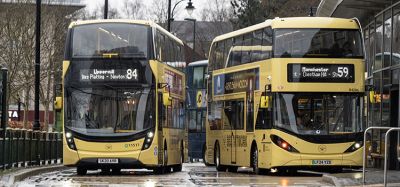Simple, easy, quick, hassle free… the case for ITSO
- Like
- Digg
- Del
- Tumblr
- VKontakte
- Buffer
- Love This
- Odnoklassniki
- Meneame
- Blogger
- Amazon
- Yahoo Mail
- Gmail
- AOL
- Newsvine
- HackerNews
- Evernote
- MySpace
- Mail.ru
- Viadeo
- Line
- Comments
- Yummly
- SMS
- Viber
- Telegram
- Subscribe
- Skype
- Facebook Messenger
- Kakao
- LiveJournal
- Yammer
- Edgar
- Fintel
- Mix
- Instapaper
- Copy Link
Posted: 6 May 2011 | John Verity, Head of Security and Compliance, ITSO | No comments yet
Earlier in 2011, Transport Secretary Norman Baker released a White Paper setting out the UK Government’s vision for local transport. It includes a statement on the Government’s commitment to delivering the infrastructure that will enable most public transport journeys in the UK to be undertaken using smart ticketing by December 2014.
One of the ways the UK Government hopes to achieve this is by working closely with ITSO to ensure technology is up-to-date and meets future requirements.
In Europe, Siim Kallas, Vice-President of the European Commission responsible for Transport, asked the Intelligent Transport Systems (ITS) annual conference in June 2010: “Why can’t I yet plan or book my journey through Europe – switching from air to rail or sea, to urban or road transport – in one single go and online?”
Earlier in 2011, Transport Secretary Norman Baker released a White Paper setting out the UK Government’s vision for local transport. It includes a statement on the Government’s commitment to delivering the infrastructure that will enable most public transport journeys in the UK to be undertaken using smart ticketing by December 2014. One of the ways the UK Government hopes to achieve this is by working closely with ITSO to ensure technology is up-to-date and meets future requirements. In Europe, Siim Kallas, Vice-President of the European Commission responsible for Transport, asked the Intelligent Transport Systems (ITS) annual conference in June 2010: “Why can’t I yet plan or book my journey through Europe – switching from air to rail or sea, to urban or road transport – in one single go and online?”
Earlier in 2011, Transport Secretary Norman Baker released a White Paper setting out the UK Government’s vision for local transport. It includes a statement on the Government’s commitment to delivering the infrastructure that will enable most public transport journeys in the UK to be undertaken using smart ticketing by December 2014.
One of the ways the UK Government hopes to achieve this is by working closely with ITSO to ensure technology is up-to-date and meets future requirements.
In Europe, Siim Kallas, Vice-President of the European Commission responsible for Transport, asked the Intelligent Transport Systems (ITS) annual conference in June 2010: “Why can’t I yet plan or book my journey through Europe – switching from air to rail or sea, to urban or road transport – in one single go and online?”
As ITSO’s Chief Advisor and Coordinator for the European funded EU Interoperable Fare Management Project (EU-IFM), John Verity believes the answer lies in the EU-IFM Project.
So what is happening with ITSO in the world of smart ticketing?
ITSO is the custodian of the UK’s defined technical standard for smart ticketing. Its aim is to help transport operators develop systems which link-up with each other, making the passenger’s experience hassle-free and the operator’s service more efficient, reliable and cost-effective.
Also, the information gathered electronic – ally and securely can be used in a variety of ways to market particular services or improve customer information, depending on whether customers opt in for those services.
ITSO’s Chief Executive Officer Michael Leach predicts that 2011 will see:
- Increasing availability of mobile phones which can be pre-loaded online to act as smartcards to allow access to transport
- A growing availability of smartcards or devices that can be pre-loaded online or at ticketing machines, initially within schemes or geographic areas before expanding to national availability over the next 3 to 4 years.
There are already some 12 million ITSOcompliant smartcards in circulation in Great Britain for concessionary users alone. Scotland and Wales (see Case Study on page …) already have country-wide ITSO smart ticketing and commercial inter-operator schemes. England is moving towards this with some areas, such as Cheshire (see Case Study on page…) and the West Midlands, running commercial, inter-operator schemes. The five biggest bus operators in the country are committed to ITSO schemes.
On the rail front, all newly-let rail franchises since 2007 have included the requirement to move towards ITSO-compliant ticketing schemes. It is expected that upcoming new rail franchises will include similar requirements.
Various schemes are currently underway with the Go-Ahead group (through London Midland) and Stagecoach (SouthWest trains).
As 80% of current rail journeys start, finish, or go through London, the implementation of the ITSO on Prestige project (IoP), where Transport for London (TfL) systems will be able to accept ITSO cards, is key to rail operators doing their bit. IoP is expected to be live by June 2013.
And what about Europe?
Across the European Community, there is a growing expectation that interoperable smartcards will significantly lower the barriers to mobility, and encourage social inclusion, particularly among migrant workers or extended families.
Unlike Britain, it is common for Europeans to live in one country and want to travel to work in another, but lack of current cross-border systems make using public transport more difficult than it need be.
As well as smart ticketing speeding up transactions, encouraging the use of public rather than private transport will also have the environmental impact of reducing carbon emissions and eliminating the waste paper tickets produced.
Seamless customer accessibility to different public transport networks across Europe using smart media means that by 2015 we can expect to have removed some barriers for public transport use; travellers will have common styles of contactless media throughout Europe which they can use for loading and paying for multiple transport products in different geographic areas. These could include smartcards, NFC-enabled mobile phones, smartphones or contactless USB dongles.
The European Commission has recently completed a study into transport smartcards, both in terms of the existing schemes and the plans and aspirations of transport operators. The study concluded that Europe needs a vision and action plan to underpin the development of integrated smart ticketing.
ITSO is very active in promoting interoperable fare management (IFM) as embodied by ITSO or similar as borderless solutions to smart ticketing. ITSO is urging the Intelligent Transport Systems (ITS) community to continue supporting the work of the IFM Alliance which is building on the vision of the already agreed Europe-wide interoperable standard for ticketing (ISO EN 24014). This means encouraging operators and suppliers to develop systems which will work together to achieve Siim Kallas’ vision. This work has strong backing from the UITP (Association of Public Transport Authorities).
We already have multiple interoperable fare management systems being used across Europe. The aim is to make sure that they can eventually all work together with a single EU-IFM template. This would give manufacturers and suppliers of equipment like ticket machines a common specification to work towards and would lead to much more competitive tendering and lower procurement costs.
The EU-IFM Project has identified the following valuable benefits for using multi-application media to enlarge interoperability across schemes:
- Coexistence of multiple ticketing applications on the same media is the most cost effective and immediate way to enlarge interoperability
- It enables every participating scheme to keep on using existing local applications and products, but make them available on a much broader range of media.
In conjunction with the IFM Forum, a demonstration was carried out in May 2010 to load a French Calypso Application and a UK ITSO Application onto a multi-application card issued by VDV in Germany.
The card was loaded with transport products from all three IFM schemes and successfully demonstrated on their respective ticket machines or validators. Each scheme’s individual security was maintained throughout and without the need to share security keys. This demonstration proved both the feasibility and practicality of the first step of an IFM project based on a multi-media approach.
The demonstration recognised that security and confidentiality systems protecting the customer’s privacy and financial details are absolutely key to gaining acceptance of any pan-European scheme.
The EU-IFM Project has already prepared a Charter to defend the principles of anonymous accessibility, and protect against abusive use of personal data either through using it for intrusive direct marketing or, more seriously, criminal hacking.
Other factors like transaction speed and ease of understanding and use will be critical to gaining customer acceptance. The objective of the EU-IFM Project is not to reduce competition, but to encourage cooperation and commonality between schemes and ensure the smart media used are complementary, interoperable and capable of multi-application use.
The vision is for travellers across Europe to download their ITSO, VdV or Translink applications onto their mobile phones and buy all the necessary tickets for their journey. The answer to Siim Kallas’ question is probably closer than he thought and ITSO and its sister organisations in Germany, France, the Netherlands and elsewhere are determined to deliver this vision through the EU-IFM Project.
Case study 1: Cheshire Travelcard
February 2011 saw another major achievement for the Cheshire Travelcard scheme when 130 more buses became ITSO smart.
The addition of the Warrington Borough Transport fleet means Cheshire bus passengers can have a smartcard which works on 500 buses – regardless of which of the six operators is running them.
This, combined with cross-border bus agreements with Flintshire and plans to bring rail operators on board, means Cheshire is truly a microcosm of national interoperable smartcard travel – encapsulating in one region exactly what the Government, EU and ITSO are trying to help roll out throughout Europe.
Forward-thinking Cheshire councils and bus operators have always been ahead of the game, introducing the Chester Travelcard back in 2002. This involved one smartcard which could be used on four bus operators’ services for one-off journeys, or weekly and monthly unlimited travel passes.
Since then, Cheshire has brought the national concessionary scheme (ENCTS) and smart ten-trip tickets on board. Last summer, the ITSO Cheshire Travelcard was introduced as a pay-as-you-go smartcard. The cards can currently be used on 140 routes provided by six operators from 11 bus depots.
So far, 200,000 smartcards are in circulation in Cheshire with 10,000 of these for commercial rather than concessionary use. Already, 60% of bus journeys in Cheshire are on smart equipped buses.
The obvious benefits for customers and operators are cashless travel, and speedier and more consistent boarding times leading to more reliable services.
Bus usage has gone up by more than 5% – far higher than the national average. This is also helped by the fact that most operators offer 10% discounts on standard single and return fares for Travelcard users.
Surveys on buses have shown that the introduction of smart ticketing machines has led to a 3% reduction in misuse and fraud for concessionary travel. This already means a saving of around £225,000 for the four unitary councils which make up Cheshire Concessionary Travel Consortium.
Colin Kennington, Principal Transport Officer for Cheshire Integrated Transport Service, attributes their success story to a trio comprising forward thinking councils and bus operators, together with his committed and skilled team.
“We’re very proud of what we have achieved so far in Cheshire,” says Colin. “Warrington coming on board is a major boost. Making these things work with all the different organisations involved is never easy. However, it’s onward and upward with ITSO as far as Cheshire is concerned. If we can do it, there is no reason why the rest of the country cannot do it. All it takes is determination and commitment.”
Case study 2: ITSO in Wales
The successful launch of Cardiff Bus’s ‘iff’ card in October 2010 was another major step towards an ITSO-compliant national entitlement card for Wales. So are things working out as expected five months on?
The ‘iff’ scheme was an ambitious project for the 230-bus fleet which is owned by Cardiff Council but independently run.
As the principal bus operator in Cardiff and the Vale of Glamorgan, Cardiff Bus already had 80% of the market, totalling some 28 million passengers a year, with 40% pre-purchasing travel on existing schemes and 32% using concessionary passes.
Almost 100% of entitled people in Wales already had smart concessionary cards because the Welsh Assembly Government funded the replacement of 600,000 cards in the first phase of the national entitlement card rollout starting in July 2009.
The government also commissioned an all- Wales back office system which involved migrating 22 existing local authority databases into one central card management system linked to a data management system (AMS/HOPS) provided by Applied Card Technologies Ltd (ACT).
It was then a question of installing 2,500 electronic ticket machines in Wales’ bus fleet, involving nearly 100 different operators. This was virtually 100% achieved by summer 2010.
The larger operators developed their own back office revenue management systems, while smaller bus operators send their data to depot systems (managed by local authorities) which feed in to the national system (HOPS).
The Cardiff Bus ‘iff’ smartcard scheme went live in October 2010 with prominent marketing through bus and other advertising. All 118,000 homes in the area were sent information and the first 30,000 cards already had £3 loaded on them. The ‘iff’ card is pre-loaded with credit which can then be topped up on bus or at the travel centre and used as a pay-as-you-go or season ticket.
To date, more than 35,000 ‘iff’ cards have been issued and feedback is that customers are very pleased with the scheme.
From December 2010, the Cardiff ‘iff ’ smartcard and Newport Bus Passport smartcards were able to be read on the 350 buses of both companies. Both schemes comply with the ITSO Specification so it was a relatively simple task to make them interoperable.
Viv Collins, the Welsh Assembly Project Manager, said: “This has been a major step forward towards our aim of having an entitlement card that works on Welsh and crossborder bus and rail services by 2014. Cardiff Bus expects to make savings by replacing the costly direct debit scheme for season tickets and reducing fraudulent use of concessionary passes. It is so much easier for passengers to use their electronic purses rather than be scrambling for the correct change each time they board a bus.”
“But the ITSO-backed system offers us much wider possibilities than just ticketing,” explained Viv. “Cardiff Bus will be able to use the information collected to give its customers a better service. For example, Cardiff Bus already gives passengers live information through Twitter and Facebook, but is now working on a system of sending customers service updates by text or email if there are problems due to congestion or bad weather. In the near future, Cardiff Bus will expand the range of products they issue using smartcards to include all their period passes1 and scholars tickets.”
Viv continued: “Looking forward, the Welsh Assembly – with support from advisors MVA Consultancy – are working up plans to develop and introduce a national e-purse that will be accepted by bus and rail operators throughout Wales by 2014. A number of pilot implementations will take place during 2011 as a precursor to this. We are also working closely with other bus operators who are interested in developing commercial products on the ITSO platform in a similar manner to Cardiff Bus and Newport Transport. This will demonstrate the cost effectiveness of the investment made by the Welsh Assembly Government in the ITSO infrastructure and its ongoing commitment to using that as part of its strategy to reduce car use and encourage sustainable transport in Wales.”
The Welsh Assembly Government is moving towards an ITSO, all-Wales entitlement card which will embrace rail and bus journeys.
Case Study 3: ITSO on Rail
First ScotRail has launched its new SmartCard. As part of a pilot project, 500 of ScotRail’s customers are trialing the SmartCard and its associated technological equipment on the popular Edinburgh Waverley to Glasgow Queen Street via Falkirk High route.
Staff first trialed the journey, opening gates and checking in and out of the station via mobile and platform validators.
Customer trials began in May 2010 with season and monthly ticket holders. After a trial sending an application pack to customer homes, it was decided that an online facility was more appropriate and was launched in January 2011 for customers to gain a SmartCard.
After receiving their cards, customers need to activate it by contacting the SmartCard Support Team. The customer can then purchase and load the season ticket of their choice at a ticket vending machine. The card can then be used at ticket gates and platform validators during journeys.
ScotRail have set up a dedicated website for customers signed up to the scheme allowing them to view their journey, transactional spend and update personal details.
In November 2008, Stagecoach Group launched the UK’s first national rail smartcard pilot with the introduction of the StagecoachSmart travel card on its South West Trains franchise. Having successfully completed the trial, South West Trains now has live ITSO smart ticketing on the following routes:
- Staines to Wokingham/Windsor & Eton Riverside
- Basingstoke to Weymouth including Lymington branch
- Isle of Wight
- Woking to Havant
- Woking to Basingstoke
- Woking to Alton
- Basingstoke to Honiton (due April 2011)
South West Trains passengers can buy ITSO smart season tickets either online, via the call centre or at Ticket Vending Machines (TVMs), with singles and returns available at TVMs.
Stagecoach has also introduced live ITSO smart ticketing on its East Midlands Trains franchise between Derby and St. Pancras, with plans to roll it out progressively across the network during 2011.
Case Study 4: Go-Ahead
Transport operator Go-Ahead has fully embraced ITSO over the past few years, and in many areas, the Group is leading the way, with several industry firsts already achieved and many more planned.
Go-Ahead’s ITSO produce is marketed as The Key. To date, Go-ahead has piloted The Key in its London Midland rail operation, initially trialling it in the West Midlands, and now rolling it out across 30 additional stations on the Snow Hill lines into Birmingham city centre. The Key smartcard allows passengers to buy their season tickets at self service machines in railway stations, or buy online and collect at stations in a one-touch transaction, meaning customers can enjoy faster passage through ticket barriers.
In Oxford, Go-Ahead’s Oxford Bus Company introduced a full ITSO scheme in 2010, and there are now over 30,000 active Key smartcards in use.
The new ITSO scheme includes a wide range of products, available to buy both online or in person at Oxford Bus Company’s travel shop in Debenhams in the city centre. There are three main product variants: annual season, for very regular commuters; period season, activated on first use and available in 1, 4 or 13 week blocks and multi journey, a convenient pay-as-you-go product, for occasional passengers.
Oxford Bus is now working with Stagecoach to introduce an inter-operable smartcard as part of the Transform Oxford scheme so that passengers can load an interoperable ITSO product on to either a Go-Ahead or Stagecoach smartcard and use it seamlessly for travel between different operators’ services.
Five further bus schemes are due to be implemented in 2011 – by Go North East, where a successful pilot has already been delivered, Go South Coast, Brighton and Hove, Metrobus and Plymouth CityBus.
In Brighton and Hove, rail company Southern is working with Brighton and Hove Buses and Metrobus to introduce multi-modal, pay-as-you-go ITSO smartcard ticketing which will enable passengers to easily switch between bus and rail modes. A pilot will be launched in late-2011 between Brighton and Seaford.
A Go-Ahead spokesman said: “We are fully committed to rolling out smartcard technology. Smartcards have the potential to revolutionise passengers’ ease of service use and encourage public transport use.”
Reference
1. A period pass is a bus pass issued for a fixed period, such as monthly or seasonal, usually also for a fixed area of travel.
About the Author
John Verity is Head of Security and Compliance for ITSO. He became Operations Manager for Rail Settlement Plan in 1999 and was then a rail sector director of ITSO before joining the company in 2004. John is also Coordinator for the EU-IFM Project, a collaborative effort to publish a route-map to interoperable smartcard ticketing across Europe.








